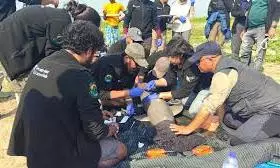
Ganges river dolphin tagged in Assam for conservation study
text_fieldsThe Wildlife Institute of India (WII), in collaboration with the Assam Forest Department and Aaranyak, has successfully conducted the first-ever tagging of a Ganges River Dolphin in Assam.
The tagged dolphin, a healthy male, was released back into the river under veterinary supervision, marking a significant milestone in the conservation of India’s national aquatic animal.
The tagging aims to provide critical insights into the seasonal and migratory patterns, range, distribution, and habitat use of the Ganges River Dolphin, particularly in fragmented or disturbed river systems. This species, found primarily in the Ganga-Brahmaputra-Meghna and Karnaphuli river networks, plays a vital ecological role as an apex predator and umbrella species in river ecosystems.
While nearly 90% of the species reside in India, their numbers and distribution have declined sharply over the past century. Despite their ecological importance, understanding these elusive mammals has been challenging due to their unique behavior - they surface for only 5-30 seconds at a time and are nearly blind, relying on echolocation to navigate and hunt.
The tagging exercise falls under the ambit of Project Dolphin, an initiative aimed at developing evidence-based conservation strategies for the long-term survival of this endangered species. The project, funded by the Ministry of Environment, Forest and Climate Change (MoEFCC) and the National CAMPA, seeks to address knowledge gaps and establish a comprehensive action plan for the species.
Union Environment Minister Bhupender Yadav hailed the achievement as a “historic milestone” in a post on X (formerly Twitter), emphasizing its importance for the conservation of India’s national aquatic animal.
“This initiative will deepen our understanding of conserving the Ganges River Dolphin and its critical habitats,” he stated.
WII Director Virendra R Tiwari echoed these sentiments, highlighting the role of tagging in creating evidence-based strategies to protect the dolphins.
Project investigator Vishnupriya Kolipakam described the tagging as a crucial step toward preserving vital aquatic ecosystems, which are not only home to diverse biodiversity but also sustain thousands of people who depend on these rivers for their livelihoods.






















